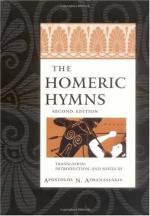“So too did Dawn of the Golden Throne carry off Tithonus, a man of your lineage, one like unto the Immortals. Then went she to pray to Cronion, who hath dark clouds for his tabernacle, that her lover might be immortal and exempt from death for ever. Thereto Zeus consented and granted her desire, but foolish of heart was the Lady Dawn, nor did she deem it good to ask for eternal youth for her lover, and to keep him unwrinkled by grievous old age. Now so long as winsome youth was his, in joy did he dwell with the Golden-throned Dawn, the daughter of Morning, at the world’s end beside the streams of Oceanus, but so soon as grey hairs began to flow from his fair head and goodly chin, the Lady Dawn held aloof from his bed, but kept and cherished him in her halls, giving him food and ambrosia and beautiful raiment. But when hateful old age had utterly overcome him, and he could not move or lift his limbs, to her this seemed the wisest counsel; she laid him in a chamber, and shut the shining doors, and his voice flows on endlessly, and no strength now is his such as once there was in his limbs. Therefore I would not have thee to be immortal and live for ever in such fashion among the deathless Gods, but if, being such as thou art in beauty and form, thou couldst live on, and be called my lord, then this grief would not overshadow my heart.
“But it may not be, for swiftly will pitiless old age come upon thee, old age that standeth close by mortal men; wretched and weary, and detested by the Gods: but among the immortal Gods shall great blame be mine for ever, and all for love of thee. For the Gods were wont to dread my words and wiles wherewith I had subdued all the Immortals to mortal women in love, my purpose overcoming them all; for now, lo you, my mouth will no longer suffice to speak forth this boast among the Immortals, {180} for deep and sore hath been my folly, wretched and not to be named; and distraught have I been who carry a child beneath my girdle, the child of a mortal. Now so soon as he sees the light of the sun the deep-bosomed mountain nymphs will rear him for me; the nymphs who haunt this great and holy mountain, being of the clan neither of mortals nor of immortal Gods. Long is their life, and immortal food do they eat, and they join in the goodly dance with the immortal Gods. With them the Sileni and the keen-sighted Slayer of Argus live in dalliance in the recesses of the darkling caves. At their birth there sprang up pine trees or tall-crested oaks on the fruitful earth, nourishing and fair, and on the lofty mountain they stand, and are called the groves of the immortal Gods, which in no wise doth man cut down with the steel. But when the fate of death approaches, first do the fair trees wither on the ground, and the bark about them moulders, and the twigs fall down, and even as the tree perishes so the soul of the nymph leaves the light of the sun.




